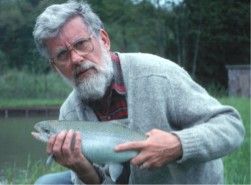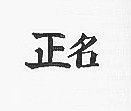Life at the Lake
a diary of living at a small lowland lakeWHAT IT'S LIKE

Early moonrise over Lake Ketchum
|
Archive Search |
| Links |
|
and s-integrator |

I continue to gallop through The Cantos of Ol' Ez Pound.
They are not exactly a thrill-a-minute, but the journey is worthwhile. And—on page 415 today—I am just past half-way through the heavy tome.
About 30 pages away The Pisan Cantos begin. I'm anxious to get to them, though I can't exactly say why. I think they were first published when I was a graduate student in English, and they were deemed important literature.
Pound—a native-born American from Idaho, of all places—was a central figure in the great intellectual activity that took place between the two world wars and centered largely in Paris. He knew everybody and had a strong influence on Joyce, Hemingway, Picasso, Gertrude Stein, and T. S. Eliot. You know, the "in crowd."
For a hick from the American West he was largely an auto-didact, which means he was self-taught. He read everything, and generally not in translation. He learned languages the way most of us try to learn dialects. When he came to Chinese history and poetry, there was no escaping it: he learned the language, much of which is pictorial or ideogrammatic. Some of the calligraphy is reproduced in the book. It is beautiful.
Of course, you have to develop an eye for such things. I am trying.
Pound recapitulates history and often does so tediously. Over time, and as a result of his disillusionment with banking and profit, he developed an abhorrence of what he called "usury." It is money-lending, a practice older than Jesus. It is a fact of life and the hub around which the wheels of nations revolve.
That people (including our Founding Fathers) are motivated by the profit motive is not new, and to reduce much of history to this crass motive is not unfair, I think. It exists. Pound recounts instance after recorded instance from early historical accounts, and from obscure sources (personal letters, for instance), of famous individuals engaged in such commerce, lending money for profit—usually at five percent.
Governments do it, rich individuals do it, businesses do it, lawyers do it. And Pound associates it with Jews. His prejudices are the prejudices of his time, and reading him today, in these times of imperative political "correctness," is often disconcerting. The "N-word" comes naturally to him. He does not think of it as being offensive.
He is generally not taught in the school system and, even on the college level, is approached on little cats' feet.
But it is not his ideas in the political sphere that makes Pound important; it is his poetry. He taught T. S. Eliot how to write poetry, for Christ's sake, and corrected Eliot's manuscripts and offered him detailed notes on how to improve poems like "The Wasteland." This is a little like Jesus going to Luke to ask how he ought to phrase one of the Gospels.
No it isn't.
Pound himself (who else?) could write poetry of the first order, though not often. He mastered some of the early Anglo-Saxon verse forms and could pound out sea-faring tales, for instance, in that powerful four-beat, highly alliterative style that formed the beginnings of the English language. It is still with us today.
The fact that he wrote Nazi propaganda from Italy during WWII and was later interred in a madhouse in the United States after the war ended can be largely overlooked today, I think, in light of his massive poetical output.
- - Comments ()
...

Newsroom employees of the Seattle PI celebrate its victory over the Times in maintaining its existence. But look how those reporters get their news—over TV!
Good news for all of us who don't want to live in a one-newspaper town. Or get their news from the arch-conservative Seattle Times alone.
Having gone over to morning publication recently, hoping to destroy its arch rival, The Seattle PI, The Times then went to court, hoping to end the joint operating agreement that let the two papers share everything except their newsrooms and each other's profits. The Times maintained it lost money three years running, which would let it out of the joa, but it included one year (there were two of them) when it purportedly lost money because of a employees' strike that halted paper production for 45 days.
Judge Canova yesterday threw out the specious argument and sent everybody back to continued employment. What a shame it would be to have lost the feisty PI and its multi-talented news crew, many of whom had been with the paper and the readers of the city for over twenty years. These include Connelly, Paynter, Hackett, Theil, and dozens who work quietly behind the scenes bringing us a first-class newspaper.
Yes, I once worked for them in their newsroom, but they soon fired me. For that matter, I worked under similar circumstances for The Times, with the same net result.
So you can't say I'm prejudiced in favor of one newspaper.
- - Comments ()
...

A bigger trout than Ketchum usually provides
After an inch of rain a week ago, the lake has sunk back to its record low level, and there is much beach exposed. The lake is a rich brown, presumably from dead algae in suspension in the water column. Visibility is less than a meter. There are bits of algal scum in the shallows, as well, and they are a gray/brown.
This means that all the vegetation is dying. And it isn't yet October.
Along the highways leading off into the foothills there is much more visibility than usual. This is because grasses, shrubs, and young trees such as alders have died from the prolonged drought. It is a subtle process and mimics the natural loss of leaves and color in fall, only this process began in early summer, and has progressed unheeded by most.
Nights are cool enough again to sleep well, and this is lowering the lake temperature by certain degrees. And my surprising measurements of temperature and dissolved oxygen, which alarmed me a week or so ago, simply indicate that the lake has "turned over."
What this means is, the lake normally becomes stratified across the course of a long summer, and at various depths the water temperature decreases and the amount of dissolved oxygen rapidly lowers, as well. But my measurements (which I did most carefully) showed that the dissolved oxygen near the top and at the bottom were nearly the same, and the stratifications have lost their great differentiations. And the temperatures were all within a degree or two of each other.
"Turning over" is a natural process and in the long run is healthy, but I keep forgetting it, and when I think about it again believe that it takes place much later in the year, say October.
And while the trout fishing isn't great, it seems to be picking up slightly. Two, foot-long trout last night about dinner time, and they fought well. When I went to release them, loose silvery scales came off in my hand. This was similar to steelhead smolts caught incidentally in the spring, when they are about to migrate to sea. But these were fall-spawning trout from an Eastern Washington hatchery.
Such things are a novelty in the Western part of the state, and never fail to amaze us serious trout fishers.
- - Comments ()
...

My father would know what this stands for
My father never swore. Instead he exercised those transparent euphemisms that made his meaning clear enough. "Fudge, baloney, heck, darn," etc.; on and on they went.
"Baked beans," in his parlance, might translate into some familiar barnyard term having to do with fertilizing a field. (The word "manure"—in true Presbyterian style—never crossed his lips; it would never attempt such a struggle.)
Which brings us to President George Bush's address to the United Nations yesterday, requesting money and manpower to defray the cost of rebuilding Iraq—a sovereign nation we bombed into smithereens because they possessed "weapons of mass destruction."
Oh yeah! "Baked beans!"
The world believes that there never were any such weapons in Iraq. The UN never found any, after a prolonged extensive search. So why does our President go before the world and lie again? He totally disregarded France and German when they said our invasion would be unjustified and unilateral. Now Bush wants UN support and money. But the forces he request under the UN banner will answer only to US military leadership.
I can only believe that Bush subscribes to the Orwellian fictional notion that a lie repeated often enough become a kind of truth. Or else, it is not lying if you can get away with it.
Once you believe the lie of weapons of mass destruction, try the phrase, "I did not bomb that country to smithereens and destroy its infrastructure. Its problems are all internal and of its own manufacture."
Or else, "Monica Lewinsky did it."
- - Comments ()
...

Chinese character from Pound's Cantos
Our two-hundredth blog entry since we began on March first of this year. One-a-day is a kind of mental vitamin.
Back to Ol' Ezra Pound for a moment. Or longer. He may have been "mad," by society's standards during World War II, but he was an important poet, part of the intellectual Renaissance of Paris in the Twenties, and a paraphraser or translator of many of the significant historical cultures and sub-cultures he visited.
When he came to ancient Chinese writings, he learned the languages, all the better to understand the people and their culture. It is astonishing to watch Pound in his Cantos take on a people and a period of time and devour them. His comprehension of something oh so foreign is incredible, and we should all feel indebted to him.
A couple of days ago I quoted from a poem he wrote in idiomatic translation from the Chinese. My quotation was not complete and now I want to resume it now:
(from Canto XLIX:)
"Comes then snow scur on the river
And a world is covered with jade
Small boat floats like a lanthorn,
The flowing water clots as with cold. And at San Yin
they are a people of leisure.
Wild geese swoop to the sand-bar,
Clouds gather about the hole of the window
Broad water: geese line out with the autumn
Rooks clatter over the fishermen's lanthorns,
A light moves on the north sky line;
where the yong boys prod stones for shrimp,
In seventeen hundred came Tsing to these hill lakes,
A light moves on the south sky line . . . ."
[Ed. A lathorn is simply a lantern, with sides of transparent horn.]
- - Comments ()
...

Not mine, but a similar Western red cedar
Lord, I pray, protect me not from my enemies and burglaring strangers, but from my friends and neighbors.
Viz. the absentee landlord next door who occasionally shows up, after months of neglect, and inflicts gross damage on his pretty little copse of mature Western red cedars and Douglas firs.
We have not exchanged a dozen words in the seven years I have lived at the lake, and those words only when I have insisted on having them, after drunken all-night orgies held by one or another of his revolving tenants. Or when one of them started taking down limbs and whole trees in order to improve the miniscule view of the lake he offers them in exchange for high rents. Then I phoned him in Seattle.
A couple of weeks ago, while a burning ban was in effect, he showed up with a professional arborist (that is, a tree cutter) and began limbing the stately conifers next door. Well, it is his property, and he has every right, etc.
I didn't like the results. He stood on his deeply shaded front porch and pointed out to his hired man what to cut. Many fine, long cedar limbs fell to the ground. I scowled but said nothing. A man has a right to maintain his property. It is certainly something none of his tenant ever did. Such as cutting the grass and picking up garbage.
Yesterday, a sunny Sunday, I am sipping hot coffee and reading the colorful inserts of the fat paper, when I hear a crackling sound. I look at my wife askance and she looks at me with a mirror look. I hasten out onto my East deck and see my "neighbor," the absentee landlord, in attendance to his land about fifteen feet from our mutual property line. He has started a fire and is throwing large cedar limbs onto the growing blaze.
Overhead is a towering canopy of mature cedars, firs, and a hemlock. All are tinder dry; so is the duff and multi-year accumulation of fallen boughs. The blaze is red-hot and growing, with very little smoke. As I watch, open-mouthed, he throws on another bough that must be ten feet in length.
"What on earth do you think you are doing?" I bellow at him. "You'll burn my house down." And, I think, if he does, he will be very regretful. "I didn't think. . . " he will explain, most sincerely. "Sorry about your loss," he might add.
The man's wife is helping him. I explain that the burning ban has been lifted a week ago, but that fires are permitted only in approved self-contained fire rings. He has one of these down by the lake, pretty much out of way of the canopy, and fires there in the past have never posed a problem of mass conflagration. In fact, while the burning ban was in effect, and those of us who live on the lake observed it somewhat resentfully, the same absentee landlord burned away in his ring, one long Sunday.
And I bit my tongue out of some dim concept of neighborliness.
Back to the present. The man's wife replied nicely that they would put out the fire. And they did. They spread the tinder-dry boughs out along the ground and doused them with pails of water drawn from the cabin. The boughs steamed and smoked, but they went out. Soon the smoke was gone, too.
The pair spent the remainder of the day cutting down more small trees and limbs, including some cedars they had planted, oh, eight or ten years ago. They now lie in a huge pile down by the lake, awaiting further pruning and burning. I hope it will be in the stone-ringed fire circle, but I have no certainty that this will be the case.
He is the kind of person—a wild card—who is in rare attendance, but must be closely watched whenever he is. I won't say he is a city boy with little or no rural understanding.
Okay, I will say that.
- - Comments ()
...

Sumi sketch by your blogger
I've been reading Ezra Pound, The Cantos; I'd read them before, but never from the beginning, quickly, as though the long poems were a novel. And I recommend this approach, since they are 819 pages long.
From Canto XLIX, and I delete the first line, which is a transitional link from what went before:
"Rain; empty river; a voyage,
Fire from frozen cloud, heavy rain in the twilight
Under the cabin roof was one lantern.
The reeds are heavy; bent;
and the bamboos speak as if weeping.
Autumn moon; hills rise about lakes
against sunset
Evening is like a curtain of cloud,
a blurr above ripples; and through it
sharp long spikes of the cinnamon,
a cold tune amid reeds
Behind hill the monk's bell
borne on the wind.
Sail passed here in April; may return in October
Boat fades in silver; slowly;
Sun blaze alone on the river.
Where wine flag catches the sunset
Sparse chimneys smoke in the cross light."
Nice, or rather I think so. This selection is not complete. More perhaps tomorrow.
- - Comments ()
...